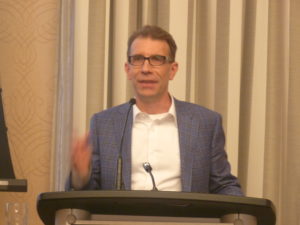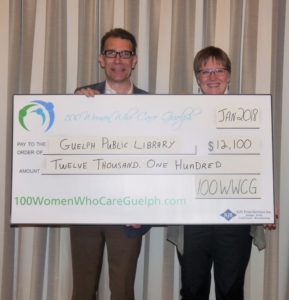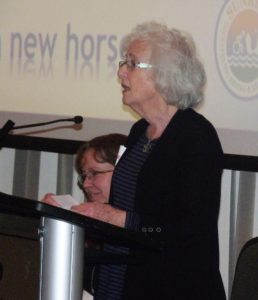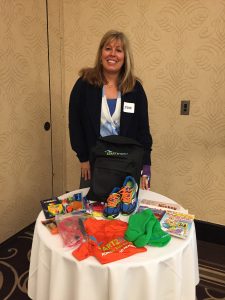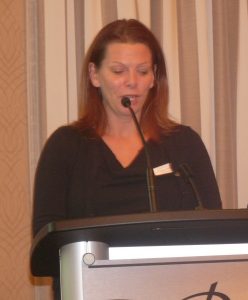Stay tuned to this page. We are expecting to publish these comments by January 20, 2019.
Category Archives: Chosen Charities say Thanks
Shelldale Family Gateway Says “Thank you!”
Here at Shelldale we provide preventative programs for vulnerable children and their families living in the most marginalized neighbourhood in Guelph.
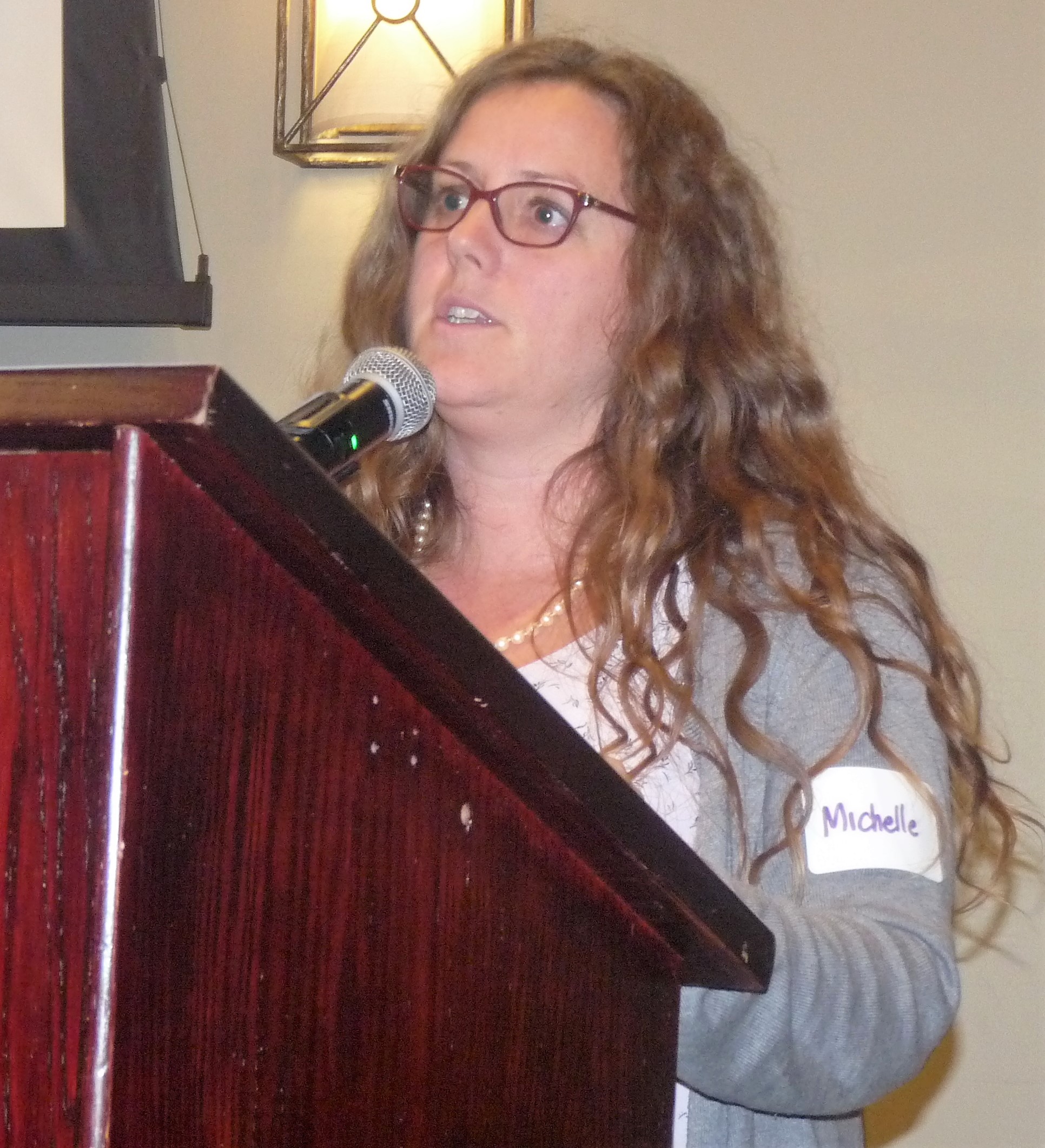
Many of the families experience food insecurity and financial hardship, there are many single parent families and we have the most percentage of families living under the Low-Income Cutoff. As well, many of the new Canadians settling in Guelph come to the Shelldale Area. For this reason many of the children attending our programs experience financial, cultural, language and transportation barriers when attempting to be involved in any sport or recreation programming.
Being located in the heart of this community with diverse staff we are able to help remove many of these barriers. For the past 25 years we have been designated as a Better Beginnings, Better Futures site which has allowed us to help strengthen this community through preventative programming including:
· promoting the healthy development of children
· intentionally supporting and promoting activities to reduce the poverty gap for children and their families
· strengthen the partnership with service providers and schools to support families to navigate the systems easier (many of these partners are located in the Shelldale Centre Hub which allows us to walk families down to other supports and services such as Family and Children’s Services, Lutherwood or Immigrant Services)
We use a holistic approach which sees the child in the context of the family and the family in the context of the community. This means that if family is not thriving (poverty and other related stressors) then the family can be less able to focus on their child thriving. If the community itself is not thriving (poor housing conditions, poorly lit areas, crime etc) then the family is less able to thrive. This approach means that we support capacity building and community building events and programming, we provide programs for the siblings, youth, teenagers and parents in order to best support the whole family.
In January 2018, the Ministry of Education amalgamated all of the Better Beginnings, Better Futures sites into one single EarlyON program for children 0-6 and their caregivers. The new guidelines mean that we are now unable to be spending our Ministry funding on the types of programs that support this holistic approach. We know the value of these programs and so have chosen to continue to fundraise in order to support these programs.
When 100 Women Who Care Guelph contacted us, it gave us the space to be able to continue to run these programs in a way that is meaningful for our families. This means that we feed children in programs (this helps the entire family), it means that we can buy shoes for children accessing our programs, it also means that we are able to pay more staff to be in program to help with the cultural and language barriers our children face as well as bring in more children to the program because we have more staff to supervise them.
It has made an incredible difference for our organization. This is why this model of giving is so impactful, you can do so much more with a lump sum of money rather than $100 coming in here and there from donors. We are so grateful to have been chosen and we can’t thank this group of generous, community minded women enough.
With gratitude
Michelle Henderson
Executive Director – Shelldale Family Gateway
(formerly Shelldale Better Beginnings Better Futures)
519-824-8498 ext. 123
“Thank You!” from VON Waterloo Wellington Dufferin (Victorian Order of Nurses)
I want to thank you for inviting me here so that I can tell you about how your generous donation will be used within our organization and to give me a chance to thank you. A special thank you to Cathy and her husband Bob for nominating the VON to be the recipients of this donation. I would also like to thank Tannis who has been wonderful to work with over these past few months. We are absolutely beyond delighted to have been chosen to receive this overwhelming and generous donation.
As many of you may know the VON is Canada’s oldest Health Care Organization. Last year we celebrated 120 years of service.
Started by a woman in the late 1800’s (I always like to stop and acknowledge that fact), the Victorian Order of Nurses was brought about to address the lack of health care in rural areas of Canada where isolated citizens were often dying unnecessarily due to the lack of accessible Heath Care Services. Lady Aberdeen, the wife of our then Governor General, saw this inequity first hand and set out to address it. Over the century that followed, the VON became synonymous with home care and were instrumental during tragedies such as The Great Halifax Explosion, WW 1, the Influenza Epidemic and the Great Depression.
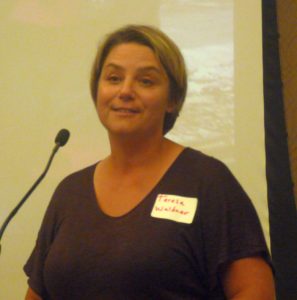
Teresa Waldner, Manager, Community Support Services for the VON, says “Thank you!” for our April Donation.
In the 1960’s the VON started to provide Community Support Services to provide further support at home. Focusing on seniors and adults living with disabilities, Community Support Services endeavor to provide independence and dignity to those who need it.
Our VON site, known as WWD, serves all of Wellington County and has an Adult Day Program in Orangeville. Tonight however, as yours is a Guelph Organization, I will focus on what programs your generous donation will be supporting.
In Guelph our main programs are Meals on Wheel, Transportation, SMART Seniors Exercise, Friendly Visiting and Telephone Reassurance and our newest and most unique program, the Senior Supportive Living Program. All of which provide much needed support to the seniors and adults living with disabilities in your community.
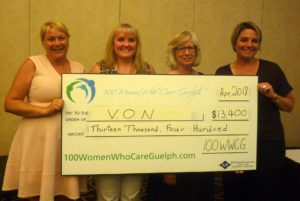
Sharon and Diane present the “Big Cheque” in recognition of our April donation to VON Waterloo Wellington Dufferin
Because of the dollars raised by your empathy, we will be able to extend service to more clients and more importantly increase our accessibility and equity by providing subsidized rides and meals to those who are extremely marginalized. This has been an important pillar in the VON’s mission and your help allows us to strengthen that commitment to this community.
I always use the analogy of bricks and mortar when explaining Community Support Services. I see Health Care delivered at home as the Bricks of home care. These are the clinical necessities to address the immediate needs of a patient due to illness or an adverse event.
I look at the Community Support Services that we provide as the mortar that keeps those bricks in place. The rides to medical appointments, a hot meal, assistance navigating a health care options or a chance to improve someone’s mobility are all integral parts in care that allow those people to remain at home safely as long as possible and when most effective, they limit further preventable suffering. Community Support Services are not always seen as necessary, but when you experience their effect first hand, you see they are invaluable.
Thank you to all of you for recognizing the value in what we do and giving us the resources to do more.
Good night.
Guelph Public Library says, “Thank you!”
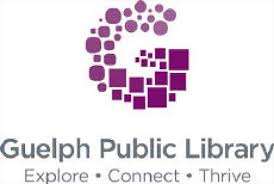 Thank you for inviting me to your meeting and giving me the opportunity to express how much everyone at the library appreciates your kind and generous donation. I want to give special thanks to Lisa Hood who nominated us and must have given a convincing argument for our case. I cannot thank each and every one of you enough!
Thank you for inviting me to your meeting and giving me the opportunity to express how much everyone at the library appreciates your kind and generous donation. I want to give special thanks to Lisa Hood who nominated us and must have given a convincing argument for our case. I cannot thank each and every one of you enough!
I’ve been at the Guelph Public Library for over 30 years and it’s a terrific place to work. We pay special attention to programming for children and I think that’s why we are so successful. We have the highest per capita circulation rate among libraries our size. It’s hard to believe, but we are now considered a ‘large’ urban public library!
One of our main commitments is promoting literacy. Reading is the most important tool a child can use to succeed in today’s complicated world. Our objective is to help as many children (and adults) in the city achieve that goal and one of our most popular methods is known as the Early Literacy Station. Actually, it’s a computer for children ages 2 to 8. Its interactive software holds over 70 programs with over 4,000 activities. The content spans all components of STEAM (Science, Technology, Engineering, Arts and Mathematics) education including reading, writing, phonics, math and problem solving, science, and social studies.
It’s hard to believe but many children still don’t have access to a computer in their home. But they can come to the library and use one of ours. The Early Literacy Station allows children to attain early literacy and school readiness skills. We now have two stations in each of our six library locations. They get an abundance of use and happy abuse from their users. They cost approximately $4,000; that means your generous contribution has allowed us to purchase three new ones!
As curious individuals I know you’ll want to drop by any of our locations to check them out
Sunrise Therapeutic Riding & Learning Centre says, “Thank you!”
On Behalf of Project Lifesaver, VSW says, “Thanks!”
Victim Services Wellington/Project Lifesaver Program
As you have probably heard from the presentations Project Lifesaver started in the United States and when I was told about it in 2011, I could not understand why we did not have more of these programs across Ontario! I am still baffled by this today.
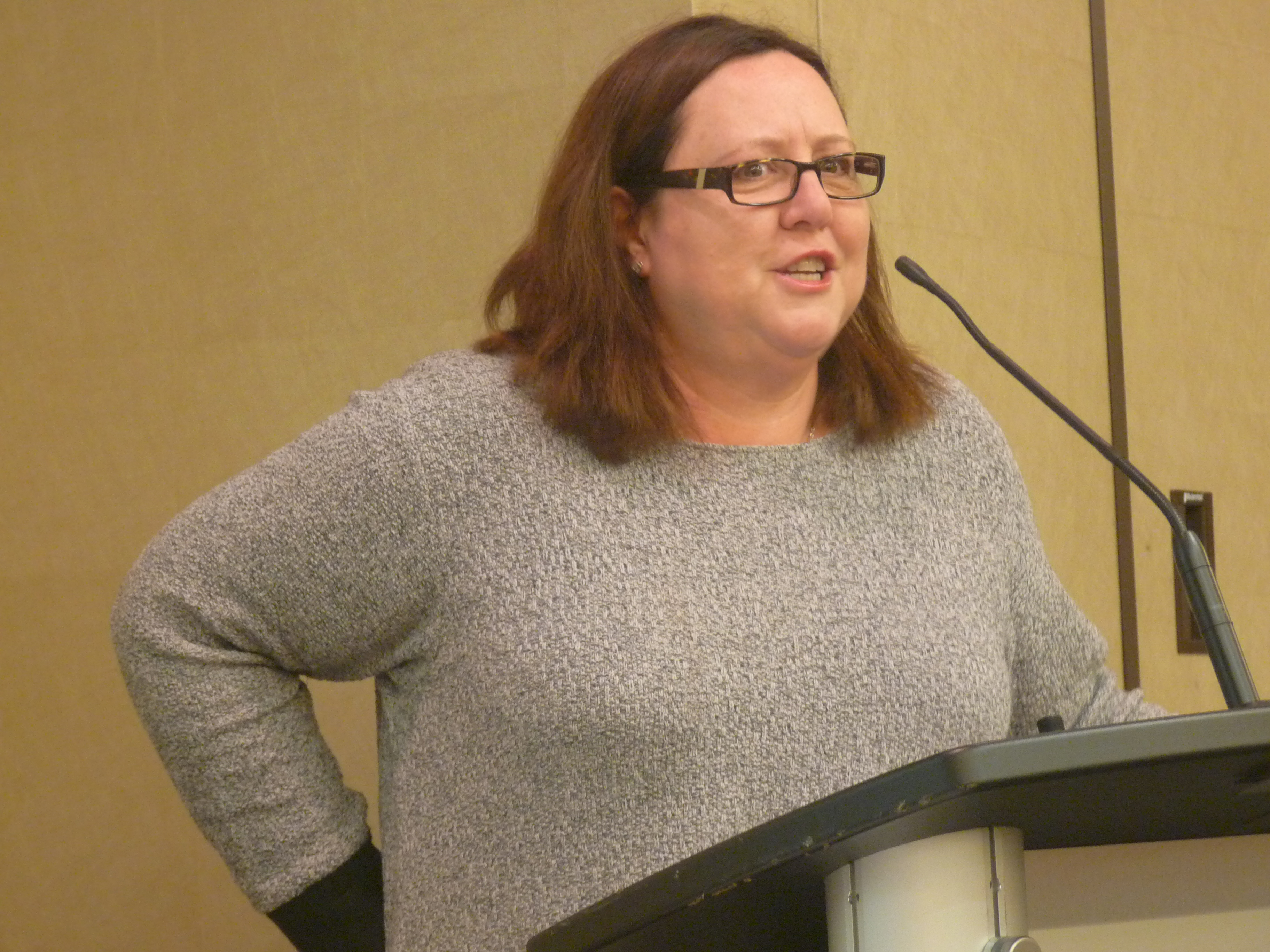
Liz Kent, Executive Director of VSW says “Thanks!” to 100WWCG for their July donation to “Project Lifesaver”.
My name is Elizabeth Kent and I am the Executive Director of Victim Services Wellington. We have 3 full time staff and approximately 85 volunteers. We provide on scene assistance to victims of crime and tragic circumstance 24/7 365 days a year! We are dispatched to assist victims by emergency services.
Missing persons calls are one of the calls we respond too when called by emergency services. I have no problem saying I have attended to assist a family whose mother /grandmother was missing and I never want to do that again! It was awful, this person was missing 22 hours and it was not only hard on the family but on everyone involved. As time went on and the hours ticked by you knew the chances of finding this person alive was less and less. This mother /grandmother had dementia so we knew she would not find her own way especially after being gone so long. This call for me was many years ago but when I heard about Project Lifesaver I was brought right back to that living room and the many tears! Please note there was a successful conclusion she was found alive! However, the pain and anguish the family went thru was awful.
When I was approached about Project Lifesaver, I did not see how we could not want this service in our community especially with our aging population. Therefore, with the help of my Board, volunteers and the Police Services (Guelph and Ontario Provincial Police Wellington) we made it happen in late 2011.
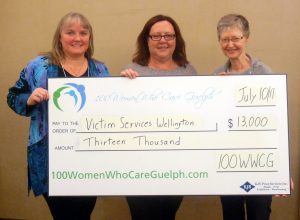
Sharon Lewis presents a 100WWCG cheque to Liz Kent of VSW and Robin Smart, the nominator of our July chosen charity, “Project Lifesaver”.
Since receiving word that we were the recipients of 100 Women Who Care we have had four searches two in Wellington County and two in the City of Guelph. One of the searches the elderly man lives in the area by Eramosa Zehrs and was located out by Costco in 36 minutes from the time he was reported missing. Another search in Fergus was for an elderly person who left the retirement home in the morning and they did not realize she had not been back until 5:30. This program assisted the police in locating her in under 40 minutes. In total, we have had 16 searches and found people quickly.
I would like to thank everyone for being part of this group and supporting the agencies in Guelph and especially for supporting our program. You are helping to give caregivers/loved ones a peace of mind and that is invaluable! I look forward to being a member of this group.
WOMEN ROCK!
Ed Video Says “Thank you!”
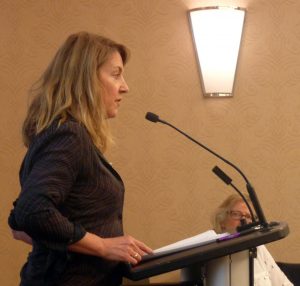
Dawn Matheson, interdisciplinary artist and former board member of Ed Video, says a wholehearted “Thank you!” for our April donation, which purchased audio and video equipment to support upcoming local video projects.
Hi. First of all I am in awe of this huge movement of women who support community organizations and initiatives.
When women come together, look out, I tell you! Every year that I age, I recognize the power of women more and more. Amazing.
In summation, your commitment is fantastic and we are all overwhelmed by your generosity.
My name is Dawn Matheson and I am a past board member of Ed Video and I am currently a working artist who has been involved in a number of outreach and production projects with Ed Video over the last decade and a half.
Just at this moment I am producing five videos in partnership with Ed Video, The Guelph Film Festival and Guelph Museum called Transported: Objects of Significance and the Immigrant Experience—the objects themselves are to be displayed in the museum screened alongside the videos that tell the stories of the objects and the people who treasure them.
I’m also researching how to get more people in to Ed Video making videos- people living with disability and difference, and especially those in the Deaf community whose language is visual, where video is a natural medium.
For nearly 20 years I’ve been producing video with community members in Guelph beginning with my first workshop on documentary production in my 20s at Ed Video where a group of us went on to record over 70 interviews with long term Guelph residents- seniors- who shared their lived experiences in our town, now used and stored as a valued digital archive of everyday life in Guelph’s history.
I was asked to speak to you because I understand the value and importance of your donation to Ed Video.
As someone who works in the arts and towards a more compassionate understanding and accepting society through art production and community collaboration, funds are not easy to come by.
Art is not always awarded monetarily, and yet art is costly to produce. It takes skill, the labour of the artist, space to create, time, and the materials necessary to create— which brings me to your donation.
I wasn’t involved in the acquisition of the equipment, but Liz and the Ed staff tell me that thanks to the generous donation from 100 Women Who Care, we have purchased filmmaking equipment that enables us to undertake multiple media projects including story production with and for Guelph’s Syrian refugee community.
Our focus has been on providing a versatile selection of cameras, lights, and audio recording equipment that improves upon or augments Ed Video’s existing gear. We purchased two cameras: the Panasonic GH5 and G85, both easy to use but also capable of producing beautiful broadcast quality video and photos. We chose these cameras for their cutting edge features, and also because their acquisition provided us with a matched set with our previous Panasonic GH4, allowing for multi-camera shoots.
These cameras are supported with multiple new lenses, making our collection well-rounded and higher quality. We purchased multiple lights to fit various situations, a versatile three-light kit ideal for both interview and narrative style filmmaking, a powerful battery-powered light that can be used for portable filmmaking, and a small easy to use light kit for emerging filmmakers.
We have added a pro-level audio recorder that is simple enough for anyone to operate. With this project, participants can record great sounding audio and conduct multi-person interviews.
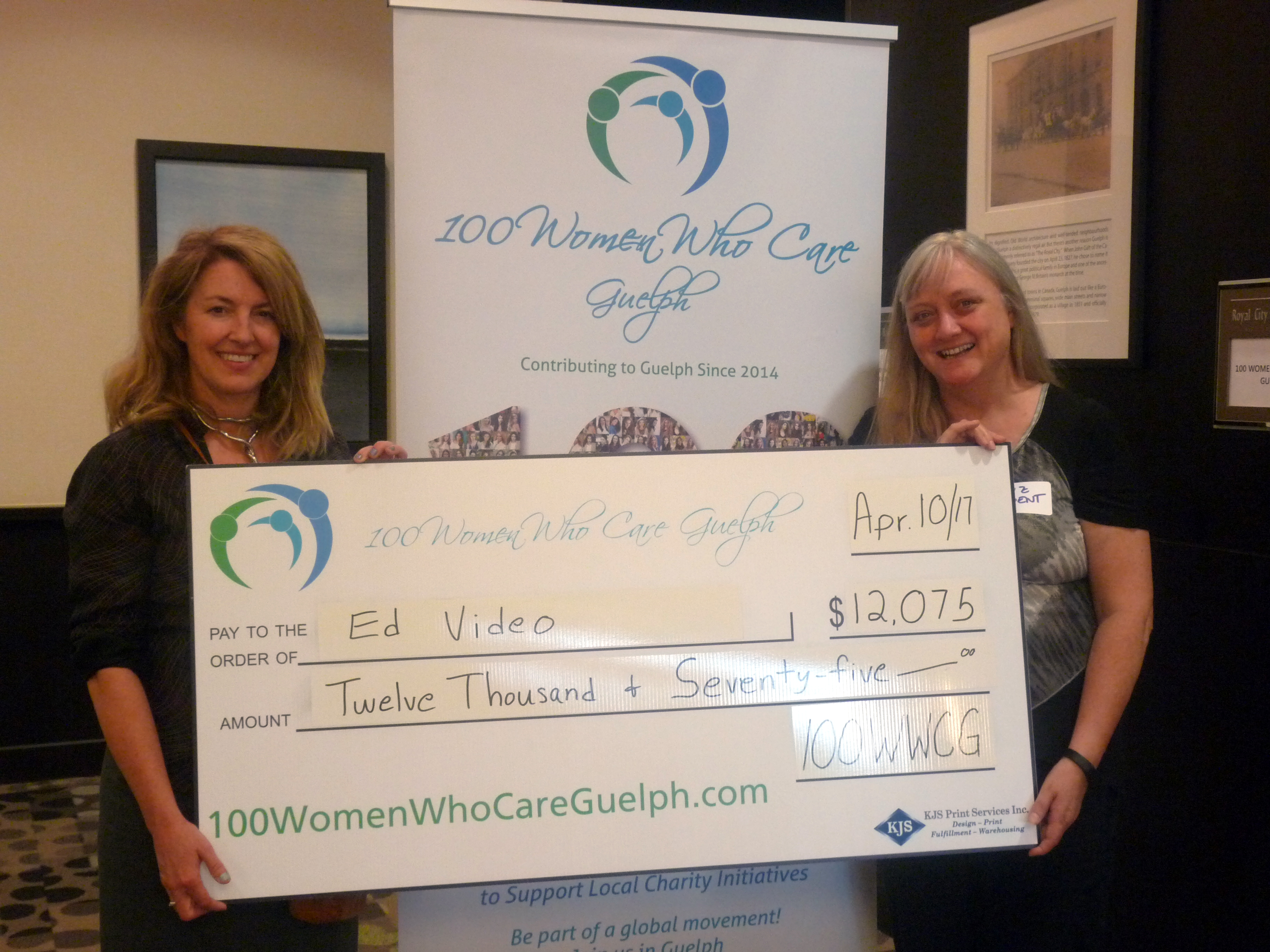
Liz Dent, director of Ed Video and Interdisciplinary Artist Dawn Matheson pose with a big cheque which represents the April donation from 100WWCG!
To bring all of this great gear together we have purchased a selection of microphones, tripods, stands, and a selection of other supporting technical equipment.
We have additionally upgraded one of our computers so projects can be edited with ease.
This array of equipment purchased makes a great impact to what we are able to provide, and whom we are able to support.
Your funds have given us the means to support our refugee community in creating and telling meaningful stories, and the tools to produce work that helps them to connect with the local and greater community.
The extended network of Ed Video members and artists and creatives in Guelph and surrounding areas will also benefit greatly.
Ed Video knows that just having equipment, while it is critical for work to be produced, it isn’t the only piece, or maybe not even the part you are interested in.
It does take engaging the right video artists, the subjects and the time to set up production.
The outreach work has begun to work with Syrian community in Guelph. We expect two or three different projects to begin this fall:
One partnering with Lakeside Hope house working directly with Syrian women in their newcomer program,
Another is being developed to connect refugee youth and Canadian youth– to help build skills, create friendships and foster a sense of belonging in a community through art production and story-sharing,
And the third is a project engaging a local Guelph- Syrian woman to act as interpreter and to aid individuals on a one- to one basis in telling their stories of migration. Her preference is to do this individually and we’ve followed her lead: taking an approach that is sensitive to how different cultures work and how they wish to be represented.
It’s a slow process to start, but I can attest that these production projects can make a huge difference to the participants’ lives. It takes a long time to create and produce video especially where we are looking at skill development and relationships and most importantly, building trust. Work done right with mutual respect and empowerment might take a year or two in development.
So, with this in mind, Ed video doesn’t yet have any videos to show you tonight.
To give you a sense of the work Ed Video does- Liz has asked me to take a few minutes to tell you about one of the projects I am currently working on as Lead Artist in partnership with Art Gallery of Guelph and Ed Video.
The project began a year ago and will continue on to a Phase Two beginning next spring.
In A Sense of Wonder I partnered with Deaf youth and kids with hearing loss (ages 8 to 22) in Guelph and throughout Ontario engaging with multimedia, performance, and video in an effort to provide access and insight into d/Deaf arts – what was really an exploration of the presence of deafness over the absence of sound.
This was done through multiple experiential workshops where the participants led the content- they decided what interested them and how they wanted to express themselves and share their world.
Four successful workshopped projects from A Sense of Wonder were just installed as videos by myself and Ed Video at The Art Gallery of Guelph and downtown at 10 Carden in a window projection across for City Hall for four Months.
The long-term goal is for the Wonder troupe of children to be empowered artistically, socially and culturally, to build a future of personal narrative, a sense of owning story and representation and possibility, and to collaborate on a deeper level across differences and ages to address barriers to inclusion for everyone through the experience of art-making.
Much the same as the goals of Ed Video.
Ed Video will be working hard to create the same kind of links to the refugee community in future productions, thanks to all of you.
In closing I just want to thank you again for your kind donation and assure you that your money will have an impact at Ed Video for many years to come.
Start2Finish says, “Thank you!”
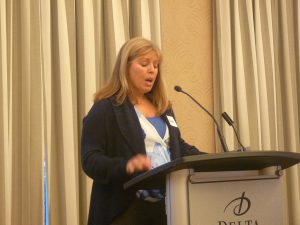
Marie Dennison, Regional Director of Guelph’s Start2finish Running & Reading Clubs, says “Thank You!”
Thank you 100 Women Who Care for inviting me here this evening. My name is Marie Dennison, Regional Director of Guelph’s Start2finish Running & Reading Clubs.
We at Start2Finsh, would like to extend our deepest gratitude to 100 Women Who Care Guelph whom so generously donated to the Running & Reading Clubs of Guelph. The money you have donated was allocated to the launch of our new Running & Reading Club at Westwood Public School, equipping an additional 60 children living in poverty in Guelph with the building blocks to graduate and succeed. The funds will go towards running shoes, t-shirts, fitness equipment, books, and the year-end 5K Running & Reading Challenge in May where the children will have the opportunity to achieve the goals they have been working so hard towards over the past months.
Our mission at Start2Finish’s is to break the cycle of child poverty by providing ongoing educational support to Canada’s at risk children throughout their school years, nurturing mind, body and social health so they are empowered to succeed and become role models for change.
In 2000, Brian Warren, former CFL All-Star and Grey Cup Champion, founded the Start2Finish program by distributing backpacks filled with quality schools supplies and books to children in at-risk schools, and hosting literacy festivals. In his broad survey of research and through many years of experience working with kids both in the USA and here in Canada, he knew that a weekly component to the program was critical to seeing meaningful change. Supporters like retired Olympic marathoner Silvia Ruegger, Alison Rochon, and others were very crucial in helping put together a comprehensive 32-week program of fitness and running. The reading portion was combined with the physical activity as a critical complement to help kids address low literacy, an accurate indicator as early as grade 1 of those prone to dropout in high school (Children living in poverty are 50% more likely to drop out before their high school graduation). Putting these two unlikely components together, the Start2Finish “Fitness Literacy Model” was addressing what he coined as the “BIG 7” – seven factors that correlate with students’ success and are tied to socio-economic status.
These factors are:
- Health
- Vocabulary
- Effort & Energy
- Cognitive-Capacity
- Mind-Set
- Relationship and
- Stress
Some quick facts to share:
- 1 million Canadian children, or 1 in every 6, lives at or below the poverty line.
- Regardless of the community, the average low income family in Canada lives on only $24,458 per year (family of 4).
- The cost of poverty to the Ontario taxpayer is $13 billion a year when looking at health care, criminal justice and lost productivity.
- The Start2Finish Fitness Literacy Model is a comprehensive, strategic approach that produces long-term social change.
- We have a $17 social return on investment for every $1 donated. The benefits of this investment in human development accrue to the individual over a lifetime.
- Start2Finish has empowered 100,000 Canadian children and families living in poverty since 2000.
- Our Running & Reading Club Fitness Literacy Model is currently operating in 38 diverse communities of complexity nationwide, including 4 schools in Guelph.
- Evaluations done at the Running & Reading Clubs by our Scientific Advisory Group volunteers and school administrators have shown the following results:
- 62% improvement in fitness
- 87% of children achieving grade level literacy scores and/or improving in literacy by 1-2 grade levels
- 85% improvement in non-cognitive character development* (qualitative data)
∙ through the combination of physical activity, learning and mentorship, participation in the Running & Reading Club program is resulting in:
- Less absenteeism
- Less bullying
- Better behaviour and performance in school
- And 76% lower potential of children dropping out of school
“I struggled in school, I struggled with my confidence, I struggled to develop discipline, I struggled to set goals for my life because I couldn’t see beyond the community that I lived in; I couldn’t see beyond the poverty that was such a reality to me. It seemed at the time that there was no other way for me to go and no other doors that were open to me. I had no idea what I was capable of doing and what I was capable of being. Start2Finish played an important role in my life because they helped me re-shape my future. They helped me carve out a plan for myself, and they motivated me to succeed.
Now they have inspired me to change my country for the better. Today, I am a university graduate, I recently graduated from the Royal Canadian Mounted Police Training Academy, and I have been posted to British Columbia as a Constable. Now I’m advocating on behalf of other kids who can’t speak for themselves. Thank you, Start2Finish, for paving the Pathway of Hope and helping me build my cycle of success.”
Start2Finish Scholarship Recipient and Program Graduate
Thank you again for inviting me to join you this evening and you’re supporting our children in Guelph through Start2finish Running & Reading Clubs.
The Guelph Chapter of Association of Parent Support Groups of Ontario (APSGO) Says “Thank you!”
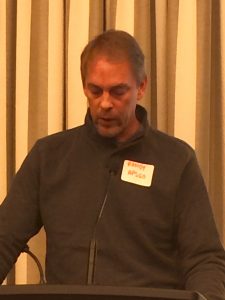
Randy Betts, Head Parenting Coach, and a volunteer for the Guelph chapter of APSGO says a heartfelt “Thank you!” to 100WWCG for their October donation.
My name is Randy Betts, and I am a volunteer parenting coach for the Guelph Chapter of APSGO, the Association of Parent Support Groups in Ontario. On behalf of our entire organization, I would like to express our extreme gratitude for the generous donation provided by the hundred plus women who care of Guelph.
It may come as a surprise to some of you that it was the care and concern of 2 women who started our charity more than 30 years ago. They cared about the poor life choices that their teenagers were making. They also cared about the impact that their childrens’ behaviour was having on their relationship with their child and their family and ultimately they were concerned that other families might be going through the same struggles. I owe a debt of gratitude to these women and the many other dedicated parent volunteers that I credit with saving my family. These APSGO parents shared their stories of struggle, gave me hope and ultimately helped me to establish peace in my home and rebuild a broken relationship with my troubled teen. APSGO continues to provide invaluable support to the parents and guardians of acting out youth in Guelph and various other Ontario communities.
Even though APSGO has provided life-changing coaching services to hundreds of families in Guelph/Wellington and the surrounding areas, we are still a relatively unknown entity. As our co-founder, Helen Jones, who is still very active in our organization, has been known to say; “APSGO is the best parent support group that no-one knows about”.
As APSGO parents know, there is a profound need for the services that we provide based on our connections with schools and numerous youth agencies and community groups in Guelph and Wellington. The youth in our community are struggling with life and face adversities such as drug and alcohol abuse, on-line bullying, depression, anxiety, self-injury, eating disorders and a range of other experiences that impact their quality of life and leave parents tearing their hair out.
Our coaches are dedicated, have first-hand experience and specific training to help parents in dealing with acting-out-youth. Many of our parent graduates, myself included, will attest to the positive effects that this program has not only had on the way that we deal with our children, but also in the interactions that we have with friends, family, coworkers and even complete strangers. The APSGO principles of building positive relationships are important in all areas of life.
Your donations are immensely important in helping us to reach out to our local community. APSGO Guelph will be using the funds from the 100 Women who care to fund a conference for parents of teenagers and young adults in our community. This event will provide valuable information for families and others supporting youth in our area, whether they are exhibiting high risk behaviours or not. The conference will provide valuable information and tools for parents of teens and older millennials while providing greatly needed exposure and networking opportunities for APSGO and other experts and organizations with-in our community.
Our conference committee had our first meeting last week and we are hard at work in pulling together all of the elements to make this a one-of-a-kind parenting conference for our community. Once again, I would like to thank you for your generous gift to APSGO, but also to your community. We look forward to updating you with more details about our event in the near future and hope that many of you are able to attend yourselves or recommend our program and services to others. APSGO Guelph meets weekly from 7:30 until 9 p.m. at Alexander Hall, Room 265 at the University of Guelph. For more details about our organization, please visit APSGO.ca
A Thank You from Alzheimer Society Waterloo Wellington
Thank you to “100 Women Who Care” for donating over $15,000 to support Minds in Motion in Guelph.
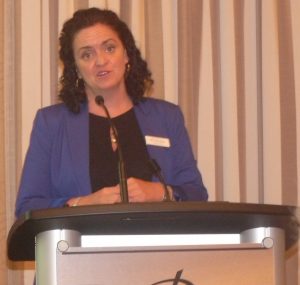
Alzheimer Society Waterloo Wellington executive director Michelle Martin expresses thanks to 100WWCG for their July donation.
What is Minds in Motion? Minds in Motion is a program that incorporates physical and mental stimulation for people living with early to mid-stage Alzheimer’s disease or other dementias, and their care partners. Two main components make up the social program. 45 to 60 minutes of physical activity led by a trained physical activity program leader and 45 to 60 minutes of mentally stimulating activities facilitated by a Minds in Motion coordinator and volunteers.
The two hour program is a great opportunity to establish new friendships with others who are living with the same experiences. People can be seen for who they are, not someone with dementia. People are in a truly safe environment where they will not be singled out, made fun of, stared at or ridiculed in any way for having a strange behaviour, saying something out of place or not being able to follow the moves. They are in a truly accepting environment where they are free to be who they are. This is a critical step in having people access programming.
What is the benefit of the program? Combining physical, mental and social stimulation can decrease the risk of developing Alzheimer’s and may slow the disease progression. For the person with dementia, Minds in Motion can improve balance, mobility, flexibility, alertness and can lead to an increased sense of confidence. For the care partner, the program is an opportunity to focus on their own health, and to find support from other care partners. And for both the person with dementia and their care partner, Minds in Motion provides an enjoyable activity that can reduce their sense of isolation.
Your support will provide 66 people with 24 weeks of programming. This is a phenomenal impact for our community. You are providing an inclusive program where people can thrive.
Minds in Motion is a province wide program that has been extensively evaluated. Here are some interesting results:
- 96% of participants report they enjoy the program
- 99% report that they felt they were treated with respect while participating in Minds in Motion
- 98% felt they were listened to during the program
- 95% of participants enjoyed the physical activity
- 91% enjoyed the therapeutic part of the program
- 97% felt the program facilitators did a good job
- 95% would recommend Minds in Motion to others
- On average, participants endurance improved by 20% and strength by 15%
- 90% of recreation centre staff and program volunteers identify an increase in their knowledge related to older adults and dementia
I would like to welcome Thayna Walter, Coordinator of Minds in Motion, to share some personal client stories.
Thayna’s Testimonials
From D
I am pleased to be able to say a few words about the Minds in Motion program. This is the fourth time I have been participated in the program and I am so pleased I have had the opportunity to be part of the program again!
I am not an expert on dementia but I have been living with it, and am always looking for a way to live my life as normal as possible. When we heard that the Alzheimer Society was presenting a program designed for persons with memory problems, I remember saying “that’s for me”! The mind portion would keep my mind busy and the motion portion would keep my blood circulating. From the reading I have done, I understand that keeping the blood flowing through the brain and being social is an excellent way to keep the brain agile. These are two things that could possibly help – how can you go wrong!
From L
I remember the first time we went to Minds in Motion and being really excited to find out that it was not only okay, but important to really set the bar high for physical exercise with people with dementia…. not demanding it, but inviting it.
I was such a relief to be socializing with other couples who were facing the same thing. There was no worry about others feeling uncomfortable in a social setting with us as a couple (as so many of our friends did at that point). That was one of the most difficult things to experience as our friends gradually got used to my husband’s dementia and we all got used to not being able to be together in the same social settings that we had always taken for granted. It was such a joy to have fun together as a couple again with other couples.
Meeting other families living with dementia has led to some very deep and mutually supportive friendships as couples and as care partners. I have been meeting with the same group of women privately every two weeks for a couple of years now. It is extremely important to us and every time we think maybe we don’t need to do this, so often a crisis happens to one of us and we reach out for support. The Alzheimer Society is instrumental in helping people connect with each other because they support us in such a healthy way.
I think that finally I want to say that being involved in such a group which focuses on a positive way of living life as fully as we can gives us hope, not maybe over the final outcome, but definitely on the journey being manageable and even often enjoyable.
 The Alzheimer Society Waterloo Wellington is so appreciative to “100 Women Who Care”. Your generous gift is truly making a difference for our community. Let’s help everyone to have their best day.
The Alzheimer Society Waterloo Wellington is so appreciative to “100 Women Who Care”. Your generous gift is truly making a difference for our community. Let’s help everyone to have their best day.

